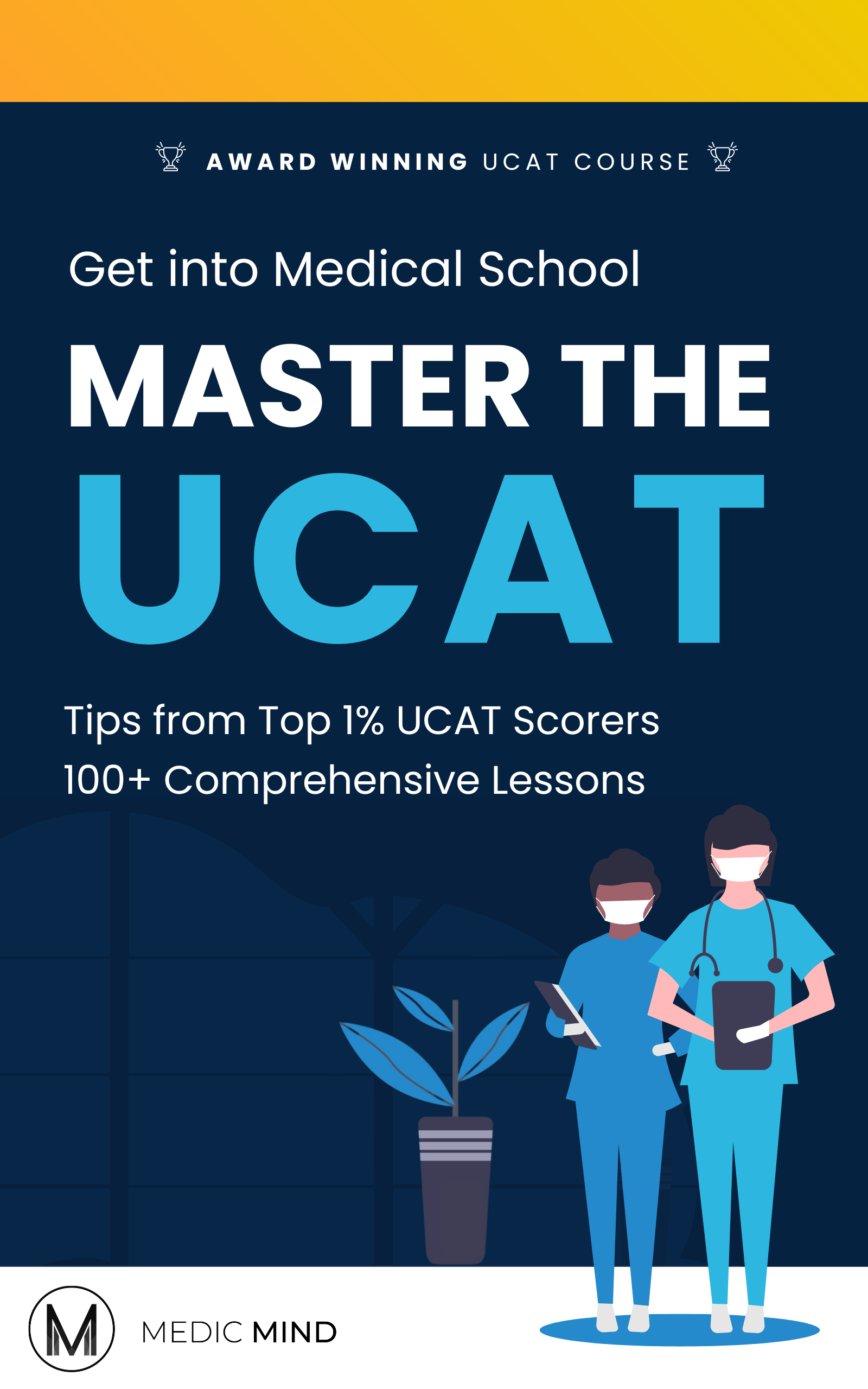Loading...

Applying to UK Medical School from UAE: A Complete Guide
Are you a UAE student with dreams of studying medicine in the UK? Looking for expert guidance on UCAT tutoring in Dubai or Abu Dhabi UCAT tutor? You’ve come to the right place!
In this comprehensive guide, we’ll walk you through every step of the application process for UK medical schools, from researching schools to writing your statement and acing the interview.
Factors to Consider When Selecting a Medical School
When researching UK medical schools, there are various aspects to consider to help you find the right fit for your goals and needs. These factors include location, teaching style, research opportunities, student support services, and faculty expertise.
You should also consider the school’s entry requirements, including academic qualifications, work experience, and language proficiency. Weighing these factors, you can limit your choices and find the schools that align with your career aspirations and personal preferences.
Top UK Medical Schools
There are many excellent medical schools in the UK, each with strengths and areas of expertise. Here is a list of some of the leading medical schools in the UK based on their reputation, research output, and teaching quality:
- University of Oxford Medical School
- University of Cambridge School of Clinical Medicine
- University of Edinburgh Medical School
- Imperial College School of Medicine
- University of Glasgow School of Medicine
- University College London Medical School
- King’s College London School of Medicine
- University of Manchester Medical School
- University of Bristol Medical School
- Newcastle University Medical School
Comparison of Different Medical Schools in the UK
When comparing different UK medical schools, looking at their strengths and deficiencies and how they match your goals and preferences is important. Some factors to consider when comparing medical schools include their entry requirements, teaching style, research opportunities, student support services, location, and student feedback.
You can also look at rankings and reviews from reputable sources, such as the Guardian, QS World University Rankings, and Times Higher Education, to help you evaluate different medical schools in the UK. By weighing all these factors, you can decide which medical schools to apply to and increase your chances of success in your medical career.
Application Process for UK Medical Schools
Timeline for Application Submission
The application timeline for UK medical schools can change depending on the specific school and program. Still, generally, applications are accepted between September and January for entrance in the subsequent academic year.
It’s important to research the specific deadlines for the schools you’re interested in and plan accordingly to guarantee you have adequate time to complete all the requirements.
Entry Requirements for UAE Students
UAE students applying to UK medical schools must meet certain entry requirements, which may include academic qualifications, language proficiency, and work experience. Most medical schools require a minimum of AAA at A-levels or equivalent qualifications such as IB, Scottish Highers, or BTEC.
International students must also fulfil English language requirements, such as a minimum score on the IELTS or TOEFL exams. In addition, some schools may require work experience in a healthcare setting to demonstrate a commitment to the field.
Application Forms and Personal Statements
The application procedure for UK medical schools generally implicates filling out an online application form and presenting a personal statement. The personal statement is a vital part of the application process. It allows you to showcase your motivation, skills, and experiences.
It should be well-written, straightforward, and tailored to each school you apply to. You should also demonstrate your interest in medicine, relevant experiences, and future career goals.
Letters of Recommendation
Most UK medical schools require applicants to submit letters of recommendation from educators, professors, or employers who can communicate their intellectual ability and character.
Choosing recommenders who know you well is important and can provide specific examples of your strengths and accomplishments. Give your recommenders plenty of time to write the letters and provide them with any necessary information, such as your CV and personal statement.
Interview Process
After reviewing applications, UK medical schools may invite selected candidates for an interview, which can be conducted in person or virtually. The interview aims to assess your suitability for the program. It may involve questions about your statement, motivation for studying medicine, ethical issues, and problem-solving skills.
Preparing for the interview is important by researching the school, practising answering common interview questions, and dressing professionally. You can improve your odds of approval into the program by performing well in the interview.

Tips for Maximising Your Chances of Admission
Suppose you’re an aspiring medical professional in the UAE hoping to study in the UK. In that matter, you may wonder how to maximise your chances of admission to UK medical schools. With many qualified applicants vying for limited spots, standing out in your application is important.
This section will provide useful tips and resources to support your journey towards becoming a medical professional in the UK, including UCAT tutoring in Dubai and Abu Dhabi with experienced UCAT tutors.
How to Stand Out in Your Application
Highlighting your unique experiences and achievements, showcasing your commitment to medicine through work or volunteer experience, and tailoring your application to each school are some tips to maximise your chances of admission.
But what about UCAT, the University Clinical Aptitude Test? UCAT scores are a critical component of the application process for many UK medical schools. If you need help preparing for this challenging exam, consider UCAT tutoring in Dubai or Abu Dhabi with experienced UCAT tutors. They can help you develop effective test-taking strategies and improve your scores.
Strategies for Crafting a Compelling Personal Statement
Crafting a compelling personal statement is also crucial for standing out in your application. Your statement is your chance to showcase your personality, motivations, and experiences. Be sure to tailor your statement to each school and highlight why you are a good fit for their program.
Also, make sure your statement is well-written and error-free. If you need help, consider seeking UCAT tutoring in Dubai or Abu Dhabi, as many tutors offer personal statement editing services.
Preparing for the Interview
Preparing for the interview is key to maximising your chances of admission. Be sure to research the school and its program, practice answering common interview questions, and dress professionally. Additionally, UCAT tutoring in Dubai or Abu Dhabi can help you prepare for interview questions related to the test.
Advice from Successful UAE Students Who Have Been Admitted to UK Medical Schools
Learning from the experiences of successful UAE students admitted to UK medical schools can provide valuable insights into maximising your admission chances. Some tips from successful students include starting early, seeking out mentorship and support, and focusing on creating a strong application with the aid of UCAT tutoring in Dubai or Abu Dhabi.
Resources and Support for UAE Students
Scholarships and Financial Aid
The expenditure of studying medicine in the UK can be daunting. Still, various scholarships and financial aid options are available to help offset the costs. Some options for UAE students include scholarships designed for international students and financial aid programmes offered by individual schools. Be sure to research and apply for relevant opportunities early in the application process to maximise your chances of receiving funding.
Support from UAE-Based Organizations
Several organisations based in the UAE offer support and resources to students interested in studying medicine in the UK. These organisations may offer mentorship programmes, networking opportunities, and resources for preparing for the application process.
Some examples of such organisations include the British Council UAE, the UAE Medical Students Association, and the Emirates Society for Medical Students. They can also provide information on UCAT tutoring in Dubai or Abu Dhabi.
Resources for Preparing for UK Medical School
Preparing for the rigorous demands of medical school can be challenging. Still, various resources are available to help UAE students succeed. Some options include preparatory courses or UCAT tutoring services, UCAT online courses, MMI medical interview live days and study groups or peer support networks.
UCAT tutoring in Dubai or Abu Dhabi can also be invaluable in helping you prepare for medical school.
In a Nutshell
Applying to UK medical schools from the UAE can be a challenging but rewarding journey. One significant aspect of the application method is preparing for the UCAT, a standardised test used by many medical schools in the UK. For UAE students looking for UCAT tutoring in Dubai or Abu Dhabi, several options are available, including online courses, private tutors, and group classes.
While preparing for the UCAT is essential, it’s also important for UAE students to research and consider factors such as school reputation, entry requirements, and application timelines. Developing a personalised strategy for applying to your ideal medical programs can maximise your chances of success.
Available resources such as scholarships, mentorship programs, and preparatory courses can provide valuable support and guidance throughout the application process. By remaining organised, focused, and passionate, highlighting your unique experiences and tailoring your application to each school, you can maximise your chances of admission and prepare for a fulfilling career in medicine.
FAQs
→ What are the English language requirements for applying to UK medical schools?
Most UK medical schools require applicants to demonstrate a certain level of proficiency in English, such as achieving a minimum score on an approved English language proficiency test like the IELTS or TOEFL. Some schools may also accept alternative forms of evidence, such as completing previous education in English or meeting other language qualifications.
→ Are there any specific requirements for international students applying to UK medical schools?
International and UAE students must meet certain requirements to apply to UK medical schools. This typically includes demonstrating English language proficiency, completing prerequisite coursework, and meeting any visa or immigration requirements.
→ What is the typical timeline for applying to UK medical schools?
The timeline for applying to UK medical schools typically begins in the fall, with most schools opening their applications in September or October. Applications are generally due by the following January, with interviews in the spring and offers of admission in the summer.
→ How important is the personal statement in the application process?
The personal statement is a crucial component of the application process for UK medical schools, as it allows applicants to highlight their unique experiences, skills, and motivations for pursuing a medical career. A well-crafted personal statement can help applicants stand out from the crowd and demonstrate their potential to succeed in medical school.
→ What resources help me prepare for the interview process?
There are a variety of resources available to help UAE students prepare for the interview process, including online resources, mock interview programs, and interview preparation courses. It’s important to practice answering common interview questions, research the specific interview format used by each school, and develop strategies for effectively communicating your strengths and experiences.
→ Are there any scholarships or financial aid options for international students applying to UK medical schools?
Various scholarships and financial aid options are available to help international students offset the cost of studying medicine in the UK. These may include scholarships designed for international students and financial aid programmes offered by individual schools. Researching and applying for these opportunities early in the application process is important to maximise your chances of receiving funding.





Was this article helpful?
Still got a question? Leave a comment
Leave a comment